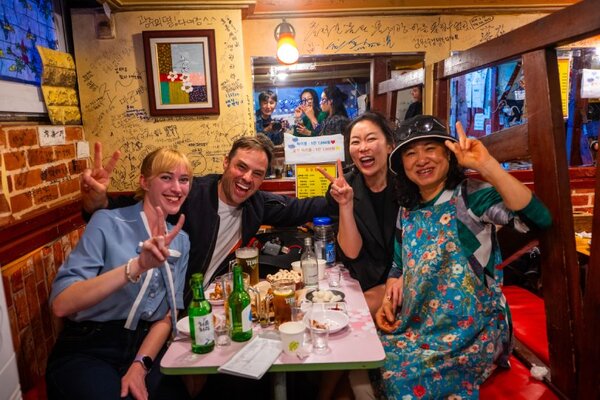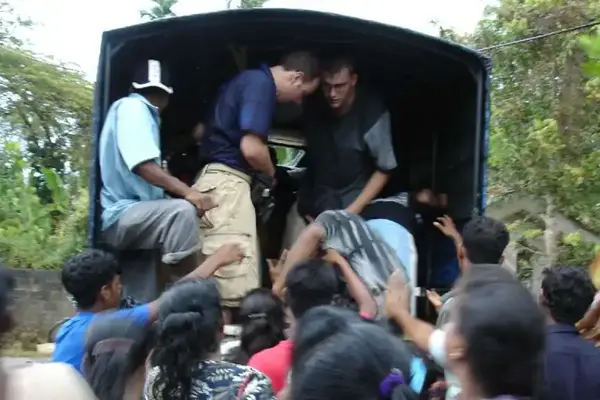'Rest assured, South Korea is still a dynamic, delicious – and very safe – destination'
Travel writer, university lecturer and street food guide Chris Tharp, who has made South Korea his home for the past 20 years, is InsideAsia’s Busan insider. After recent events in the country made headline news around the world, Chris tells TTG why agents and their clients have nothing to worry about.
It’s amazing to think I’ve been living here in South Korea for 20 years now, and what’s even more astounding is the transformation that’s taken place here.
All those years ago, when I told people back home in the United States or other Westerners I met while travelling that I was, indeed, a resident of Korea, their brows would furrow as they tried to comprehend what they had just heard.
That’s all changed, and the country I’ve called home for so long is now very much in the global spotlight thanks to the hit films, dramas and pop music this little Asian country exports, along with its cars, semi-conductors, smartphones, ships, and so many other products.
This has also resulted in South Korea finally becoming a tourism hotspot.
That said, modern South Korea is a nation still finding its feet in a region where shadows of the Cold War linger in the barbed wire, watchtowers and minefields of the Korean demilitarised zone. Things have certainly gotten shaky a few times during my tenure here, and a couple of weeks ago, we saw one of those hiccups no one welcomes, but we nonetheless have to deal with.
Like most folks, I didn’t have "South Korean president declares martial law" on my 2024 bingo card, and I was every bit as shocked as the rest of the world when my wife, Min Hee, came into my office late on a Tuesday night to deliver the bizarre news.
At first, I thought it must be in response to provocation by North Korea, but as I hastily searched the web while she did her best to explain the situation, I learned that – appalling as it was – it appeared to be nothing more than desperate bit of political manoeuvering by an extremely unpopular leader.
As the hours ticked by, it became apparent president Yoon Suk Yeol’s attempt at a power grab was a flop, and that the military he was counting on to make his move didn’t have the stomach to do away with the democracy South Koreans have spent decades fighting so hard to attain.
The people also showed up, challenging the soldiers and holding a vigil outside the National Assembly where a vote was taken to repeal President Yoon’s reckless decree. Cooler heads prevailed, and the nation – along with much of the world – breathed a sigh of relief.
Indeed, this country’s democracy proved more resilient than Yoon and his accomplices anticipated, and he has since been impeached by a massive majority in the National Assembly, including many members of his own party. His deputy has since been put in charge, and Yoon’s fate is now in the hands of the South Korean Supreme Court.
That night, and for a few days following, I fielded messages from friends and loved ones in the US and beyond, reaching out to check we were play while asking too for an on-the-ground explanation of what was going on.
’I’ll worry when I see Koreans worrying’
I get it. Phrases like "martial law" and "coup d’etat" are scary stuff. The events Yoon put into motion have dimmed South Korea’s neon lustre, and we’re already feeling this in the tourism sector. Political instability – real or perceived – has a way of scaring people off.
All I can say is that here in Busan and elsewhere, life goes on as normal. The markets are open, the streets are buzzing, and the barbecue joints are full of residents gorging on grilled pork washed down with little green bottles of soju. There is no police or military presence. There is nothing, other than a few banners on the streets and some talking heads on TV, to suggest a political crisis. South Korea is open for business, and is as vibrant and delicious as ever.
Admittedly, this is a country where politics can get messy. Two of the last three presidents have been convicted of corruption and jailed. One, the last to be impeached, still sits behind bars.
Like the US, things are very polarised, and the two sides go after each other with knives out. That said, when someone crosses a line like President Yoon did, South Koreans have a way of coalescing to protect the republic they value so much. Perhaps the country’s hardball political climate is just one of the things that makes it so fascinating.
In the 20 years I’ve been here, I’ve seen my fair share of upheavals, but I guess what I’m saying is that I’ll worry when I see Koreans worrying. And while the people answered the call when things went sideways a couple weeks back, no one is stressing out. Most Koreans know democracy can be a bumpy road, and they’re riding it like champs, making kimchi and packing the country’s cafes, restaurants, and boozers all along the way.
And if there’s one silver lining for visitors, it’s that all of this nonsense has made South Korea currency – the won – slip even further, which means this country is cheaper than it’s been in decades. So don’t let the headlines scare you off. There’s never been a better time to come.
Chris Tharp is one of Inside Asia’s insiders. Inside Travel Group’s cultural adventure specialist InsideAsia has just launched its first South Korean small group tour, Soul of Korea, with departures available from May 2025.















